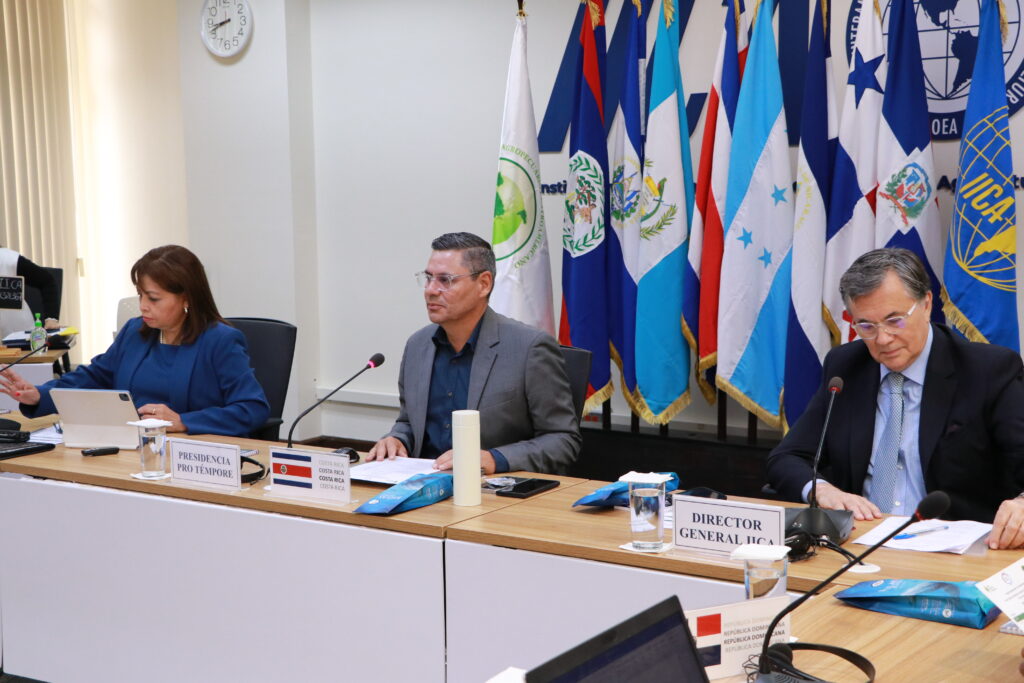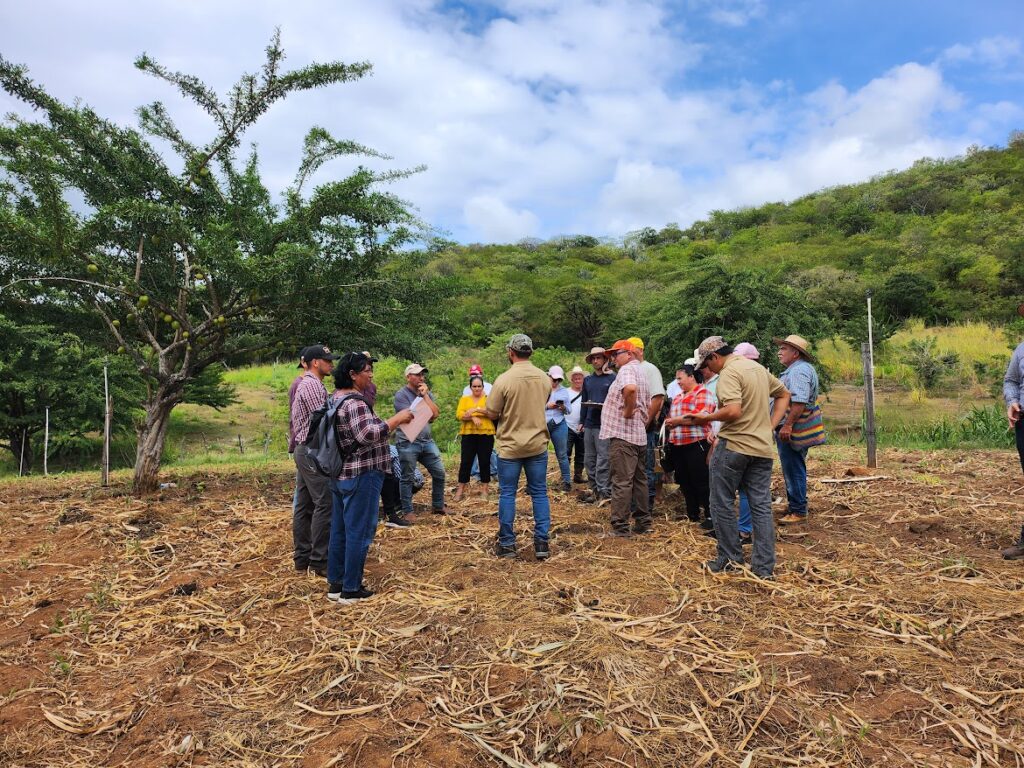Análisis expone las experiencias, brechas, necesidades y buenas prácticas en la implementación de metas climáticas de Brasil, Bolivia, Colombia, Ecuador, Guatemala, Honduras, México y República Dominicana.
San José, 2 de setiembre de 2022 (IICA) – La agricultura familiar es uno de los sectores más vulnerables al cambio climático debido a los eventos extremos relacionados con él, aunado a la falta de financiamiento, el deterioro de la salud del suelo y los altos costos de producción; sin embargo, en América Latina y el Caribe este grupo realiza importantes aportes a la resiliencia, adaptación y mitigación, los cuales muchas veces son invisibilizados.
Así lo señala el documento “El Acuerdo de París y el agro: una mirada a la implementación de las NDC en América Latina”, elaborado por el Instituto Interamericano de Cooperación para la Agricultura (IICA), con el financiamiento del Fondo Internacional de Desarrollo Agrícola (FIDA).
El análisis expone el estado de la implementación en el agro de las Contribuciones Determinadas a Nivel Nacional (NDC) en Brasil, Bolivia, Colombia, Ecuador, Guatemala, Honduras, México y República Dominicana, establecidas para operativizar el Acuerdo de París, bajo la Convención Marco de las Naciones Unidas sobre el Cambio Climático (CMNUCC).
Este año, el agro y sus aportes a la mitigación del cambio climático y la sostenibilidad serán uno de los principales focos de atención durante la Conferencia de las Partes (COP27) de la CMNUCC, debido a los retos que la crisis climática impone y las oportunidades que brinda el sector para incorporar la ciencia, la innovación y la tecnología a las formas de producción de alimentos, un asunto fundamental para garantizar la seguridad alimentaria y nutricional del planeta.
En el camino hacia la COP27, programada para noviembre del 2022 en Egipto, el IICA facilitará un proceso de búsqueda de consensos entre los Ministros y Secretarios de Agricultura de las Américas, para que el sector lleve una voz unificada a ese foro climático. Dichas autoridades participarán en un encuentro pactado para 22 y 23 de setiembre, en San José, Costa Rica.
Retos de la agricultura familiar en la lucha climática
El documento elaborado por el FIDA y el IICA evidencia avances importantes en la implementación de los compromisos adquiridos por los países mencionados para enfrentar el cambio climático a nivel sectorial, una mejor priorización de acciones y una mayor participación de los actores del agro en este objetivo, pero también brechas en la difusión de planes de acción, la innovación, el financiamiento y el registro de los aportes de la agricultura familiar a las NDC.
“Las buenas prácticas que se están desarrollando en los países debemos articularlas en una red para comenzar a cuantificarlas. Sin datos no vamos a tener el soporte necesario para que los aportes de la agricultura familiar sean reconocidos”, dijo Miguel Altamirano, coordinador del proyecto INNOVA-AF, ejecutado por el IICA y financiado por el FIDA.
De acuerdo con el reporte, el financiamiento, el fortalecimiento de capacidades, una mejor recopilación de datos para la toma de decisiones y la vinculación a los mercados son necesarios para incentivar una mayor producción resiliente al cambio climático.
El informe se basa en entrevistas a más de 70 autoridades de agricultura y ambiente, y especialistas públicos y privados de los países mencionados. Pone sobre la mesa la potencial contribución de la agricultura familiar para alcanzar las metas del Acuerdo de París.
“La contribución de los pequeños agricultores todavía necesita ganar visibilidad dentro de las NDC para que este esfuerzo pueda ser contabilizado y recompensado, esto es muy importante cuando pensamos en la arquitectura de financiación internacional del desarrollo rural y la adaptación al cambio climático, principalmente en la investigación, el desarrollo y la innovación de la agricultura familiar”, mencionó Frederico Lacerda, analista de Operaciones y Proyectos del FIDA en Brasil.
De acuerdo con la gerente del programa de Acción Climática y Sostenibilidad Agropecuaria del IICA, Kelly Witkowski, “la agricultura es un sector único en su potencial para fomentar sinergias entre la adaptación y la reducción de emisiones y requiere mayores recursos técnicos y financieros para aumentar y potenciar su contribución a la respuesta al cambio climático”.
“Es indudable que los efectos del cambio climático ejercen una presión adicional sobre la pequeña y la mediana agricultura, y los recursos críticos como el agua. Existen en nuestra región cerca de 21 millones de pequeños y medianos productores, no se pueden dejar afuera”, afirmó Mario León, gerente del programa de Desarrollo Territorial y Agricultura Familiar del Instituto.
Los países incluidos en el estudio cuentan en mayor o menor medida con marcos legales y arreglos institucionales para desarrollar las capacidades de su sector agropecuario y participar en la agenda climática y en los procesos de implementación de las NDC; sin embargo, a pesar de los grandes aportes del sector al logro de las metas y prioridades, se observa que sus avances mantienen rezago en comparación con otros sectores más expuestos a la agenda climática, como el ambiental y el energético.
Para Verónica Bunge, directora de atención de cambio climático en zonas prioritarias de la Secretaría de Agricultura y Desarrollo Rural (SADER) de México, “es necesario reconocer la heterogeneidad en los sistemas de producción y procurar la coexistencia de todos estos sistemas. Si bien la agricultura familiar es fundamental, también existe la agricultura industrial y tenemos que ver de qué manera se suma a los procesos de sustentabilidad en el territorio. Es fundamental promover la acción colectiva”.
“La principal lección aprendida en el proceso de las NDC en Colombia es que tenemos que priorizar la adaptación en nuestros países, nuestros agricultores cada día son más vulnerables, los pequeños no tienen mucha capacidad en recursos ni en tecnología para adaptarse. Hay que trabajar muy de cerca con ellos con estrategias específicas y promover las semillas tradicionales que poseen las comunidades porque en términos de cambio climático son muy resilientes”, expresó Nelson Lozano, coordinador forestal del Ministerio de Agricultura y Desarrollo Rural de Colombia.
“Si queremos incrementar nuestra ambición en las NDC lo fundamental es priorizar las medidas de acuerdo con las condiciones nacionales y del territorio”, enfatizó Tatiana Paredes, directora de riesgos y aseguramiento agropecuario de la Secretaría de redes de innovación agropecuaria del Ministerio de Agricultura de Ecuador.
Más información:
Gerencia de Comunicación Institucional
comunicacion.institucional@iica.int










